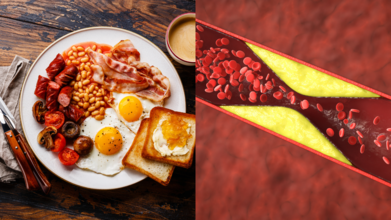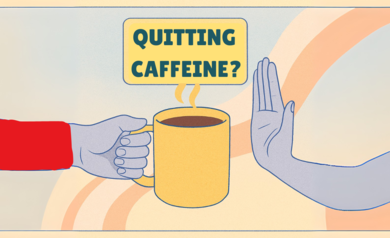- Health Conditions A-Z
- Health & Wellness
- Nutrition
- Fitness
- Health News
- Ayurveda
- Videos
- Medicine A-Z
- Parenting
- Web Stories
Healthy Appetite: Factors That Affect Change In Hunger

Image Credit: Canva
Appetite is an integral part of the human experience, signaling to the body that it needs refueling and nourishment. While hunger indicates a biological need for food, appetite is the psychological desire to eat. It is important to note the difference because appetite is variable, changing according to what is happening in the mind and the body, so much so that it impacts how much and what we consume.
Understanding appetite and its changes can help maintain a balanced relationship with food, ensuring better physical and mental health. This feature delves into the nuances of appetite, the factors that influence it, and how individuals can manage changes effectively.
What is Appetite?
The appetite is the desire to consume food. This can be regulated by complex interactions between the digestive, endocrine, and nervous systems in the body. Unlike hunger, which appears whenever the body requires food, the appetite is usually linked with sensory experiences and emotions. Hormones like ghrelin and leptin govern both hunger and appetite. Ghrelin sends out signals of hunger, whereas leptin informs the brain about fullness or satiety.
It is ironic that appetite could exist independent of hunger. For example, you will have a sudden urge for that slice of cake after consuming a large meal because the looks or aroma stimulate your want to eat although your body may not need more calories at the time. Conversely, hunger can be present without significant appetite as when illness brings about an aversion for food.
Factors Affecting Appetite
1. Environmental Factors
External cues, such as the sight and smell of food, can significantly stimulate appetite. Celebrations, advertisements, and even the time of day can trigger the desire to eat, regardless of hunger.
2. Lifestyle Choices
Sedentary habits, irregular eating patterns, and lack of physical activity may alter appetite regulation. In contrast, regular exercise often enhances appetite, promoting a balanced dietary intake.
3. Mental Health
Depression, anxiety, or stress can result in a change of appetite. Stress leads to overeating, whereas depression may result in an inhibitory urge to eat anything.
4. Physical Health
Some chronic diseases, for example, cancer, kidney disease, or hypothyroidism, cause appetite suppression. In contrast, diabetes and hyperthyroidism tend to enhance the appetite.
5. Sensory Factors
The senses—smell, taste, and sight—play a pivotal role in appetite stimulation. Foods that are visually appealing and aromatic are more likely to make someone want to eat.
6. Medications
Some medications are natural appetite suppressants or stimulants. Chemotherapy drugs, for instance, commonly decrease appetite, and corticosteroids and antidepressants can increase it.
When Appetite Changes Occur
Loss of Appetite
A loss of appetite can be caused by a variety of conditions, including:
- Anorexia nervosa: A mental disorder characterized by eating very little.
- Chronic illness: COPD, dementia, and hepatitis all typically decrease appetite.
- Pregnancy: Nausea during the first trimester can cause loss of appetite.
- Medications: Antibiotics and morphine are two of the most common causes.
Increased Appetite
An increased appetite may be a symptom of underlying conditions, including:
- Bulimia or binge-eating disorders
- Hormonal imbalances: Overactive thyroid or hypoglycemia can increase your appetite.
- Medication side effects: Corticosteroids and tricyclic antidepressants can increase your appetite.
Managing Appetite Changes
How to Raise Your Appetite
1. Favorite foods: Eating foods that you enjoy can stimulate your interest in food.
2. Exercise often: Physical activity can be a stimulus for hunger especially in the elderly.
3. Flavor enhancers: Herbs, spices, and sauces can enhance flavor, making food more palatable.
4. Professional consultation: A dietitian may help plan meals that could suit a person's lost appetite.
How to Suppress Appetite
1. Hydration: Sometimes, thirst can masquerade as hunger, so drinking water is necessary.
2. Mindful eating: Savoring food takes longer; hence, one learns when he or she is really hungry and not just stuffing the mouth.
3. Depend on social support: Taking meals with relatives prevents overeating due to psychological effects.
4. Visit a doctor: A healthcare professional can advise one on how to intervene when increased hunger persists.
When to Seek Medical Attention
A medical practitioner should be consulted in cases where appetite has become unrelenting, altering the weight, mood, and daily activities of a patient. For example,
- Unexplained weight loss due to reduced appetite may indicate a serious health condition.
- Increased hunger, resulting in weight gain can be a sign of hormonal imbalances or side effects from medications.
- A psychological issue such as bingeing or anorexia will require the intervention of a physician or therapist.
What to Do When You Can't Eat
For those experiencing loss of appetite, simple changes can make eating easier:
- Liquid meals: Nutrient-rich smoothies or soups are easier to consume.
- Make the environment appealing: Set a beautiful table to enhance the dining experience.
- Use supplements: Under a doctor's supervision, oral nutritional supplements can ensure adequate nutrient intake.
Appetite is a dynamic part of health, influenced by various psychological, physiological, and environmental factors. If one understands its mechanisms and manages fluctuations well, maintaining a balanced diet and overall well-being would be easier. If the changes in appetite persist, it is best to see a healthcare professional to assess the underlying causes and start interventions accordingly.
Two Breakfast Foods People With High Cholesterol Should Absolutely Avoid

If you are dealing with high cholesterol, there are two breakfast favourites you need to watch out for. In fact, you should consider cutting them out of your diet immediately. Health experts have identified these processed meats as some of the worst offenders when it comes to raising levels of LDL, or “bad”, cholesterol.
According to health experts, sausages and bacon are two of the “worst” offenders when it comes to raising cholesterol, Express.co.uk reported. That is because these processed meats are packed with saturated fat, which is one of the main contributors to high levels of LDL cholesterol, the type that clogs your arteries and increases your risk of heart attacks and strokes.
While cholesterol is not all bad, your body actually needs some of it to function properly. But the trouble starts when the amount of LDL (low-density lipoprotein) cholesterol in your bloodstream gets too high. This type of cholesterol is often dubbed “bad” because it can build up inside your blood vessels, harden over time, and eventually form blockages.
And what is one of the biggest contributors to this blockage? Your diet. Eating foods rich in saturated fat can push those LDL levels higher, which is why some everyday favourites are now on the cholesterol watch list.
Saturated Fat
According to UK guidelines, men should aim for no more than 30 grams of saturated fat per day, while women should cap it at 20 grams. But one pork sausage alone can contain up to 10 grams of saturated fat. Add two rashers of bacon to that plate, and you are likely already tipping over your recommended limit before mid-morning.
Processed meats like bacon, sausages, and salami are particularly high in saturated fats. A single serving of these can provide a quarter (or more) of your daily allowance. That is without counting the butter on your toast or the full-fat milk in your tea.
It is Not Just the Meat
Bacon and sausages may be bad, but they are not the only ones stirring trouble. Writing for the British Heart Foundation (BHF), senior dietitian Tracy Parker says these are the other cholesterol-boosting foods:
- Butter, lard, and ghee
- Coconut and palm oil
- Full-fat dairy products
- Cakes, biscuits, and pastries
- Chocolate
These items are high in saturated fats and sneak their way into our meals more often than we think. A few chocolate biscuits here, some buttered toast there.
A Smarter Start to the Day
What should you eat for breakfast if you are trying to keep your cholesterol in check? Go for fibre-rich foods, lean proteins, and healthy fats. Porridge oats, wholegrain toast, eggs (in moderation), nuts, and plenty of fruits are good choices. Avocado on toast might be trending for a reason.
Of course, it is not just about ditching certain foods. The NHS recommends a holistic approach to lowering cholesterol: eating less fatty food, exercising regularly, quitting smoking, and cutting back on alcohol. All of which can help get those cholesterol numbers back in the safe zone.
Rethink the Fry-Up
That full English might be tradition, but it is also a cholesterol bomb for many people. Sausages and bacon might look and smell delicious on your plate, but their saturated fat content can quietly nudge your heart health in the wrong direction. If you are already dealing with high cholesterol, it might be time to give your breakfast a heart-friendly makeover. It does not mean giving up flavour, just shifting it. Swap the greasy meats for grilled tomatoes, mushrooms, and beans. Try a veggie sausage if you are craving the texture, or go continental with yoghurt and fruit.
What Is The 'Jordan Formula' For Eating Right?

Credits: Canva
It’s a familiar feeling: you sit down with your favorite food—maybe samosas, biryani, or something sweet, and before you know it, you’ve eaten far more than you intended.
Then comes the guilt, the bloating, the uneasy stomach, and a promise to “never do that again.” Sound familiar?
Overeating, especially when indulging in comfort or festive foods, can lead to digestive issues like gas, heaviness, and acidity. While enjoying food is a wonderful part of life, many of us struggle with portion control—especially when it comes to the dishes we love most.
Celebrity nutritionist Rujuta Diwekar, known for her relatable approach to food and fitness, recently shared a simple trick to stop this cycle.
In a video posted on her Instagram, she introduced what she calls the “Jordan Formula”—a mindful way to enjoy your food without overdoing it or feeling guilty later.
What Is the Jordan Formula?
The concept is surprisingly simple, yet effective. Rujuta explains it using an example most Indians are familiar with: sabudana vada.
Here’s how it works:
- Take one sabudana vada and eat it.
- Before reaching for the second one, ask yourself honestly: Can I also eat a third?
- If the answer is no, then don’t eat the second. Stick to just one.
Similarly, if you’ve eaten three vadas, pause and ask: Can I eat a fourth or even a fifth comfortably? If not, stop at three.
This approach trains you to check in with your body before continuing to eat, helping you stop just short of feeling full, when your stomach is still comfortable and your mind still in control.
Why This Works
This small pause creates a moment of mindful eating, something that’s missing in most binge-eating episodes.
According to Rujuta, this method allows you to enjoy every bite without feeling deprived. You’re not saying no to the food, you’re just saying yes to your body’s signals.
In her Instagram caption, she writes:
“If you are guilty of eating mindlessly, the Jordan formula can help. An easy way to enjoy every bite without guilt or gas.”
This formula encourages a more thoughtful relationship with food—one where you're present with each bite rather than rushing through it and paying the price later.
Eating Mindfully in Changing Seasons
Rujuta also reminds us that our appetite changes with the weather. You may notice that you're less hungry during scorching summers or harsh winters, and that’s completely natural. In warmer months especially, our digestive systems tend to be more sensitive, making it important to:
- Increase fiber intake through seasonal fruits and vegetables
- Stay hydrated with water, nimbu pani, or buttermilk
- Choose lighter meals that are easy to digest
This helps support digestion, prevent bloating, and maintain energy levels without overeating.
This Is How Your Body Reacts When You Quit Caffeine

Credits: Health and me
For millions of people, the day doesn't truly begin until that first cup of coffee hits. In the United States, around 85% of adults consume caffeine daily—most of it from coffee, but also from tea, soda, and energy drinks. It's part of the culture. But what happens when you stop? Whether you're cutting back or quitting cold turkey, giving up caffeine can bring real changes to your body—some uncomfortable, some surprisingly beneficial.
For once let's face it, caffeine is literally everywhere and in most of what you consume daily. In your morning coffee, afternoon tea, energy drinks, even chocolate! Most of us depend on it to power through the day but have you ever noticed what happens when you skip it for a day or two? The headache creeps in, your energy drops, and suddenly, everything feels harder. That’s not just in your head. It’s your body responding to withdrawal. And while it might feel rough at first, quitting caffeine can lead to some surprising (and honestly, pretty great) benefits—if you stick with it long enough to see them.
Why People Quit Caffeine in the First Place?
Caffeine, at its core, is a stimulant. It boosts alertness by interfering with adenosine, the brain’s sleep-inducing chemical. That can be helpful—especially if you’re battling an early morning meeting or a long commute. But for some, that stimulation crosses a line: triggering anxiety, insomnia, acid reflux, or digestive issues. People with conditions like hypertension, GERD, IBS, anxiety, or sleep disorders may actually feel worse with regular caffeine intake.
Others quit caffeine to manage their sugar intake—especially if their caffeine comes in the form of caramel-drenched lattes or sodas loaded with high-fructose corn syrup.
Is Caffeine Withdrawal Real?
Skip your usual morning cup and you might feel it within hours. Caffeine withdrawal is common and can be surprisingly intense. It’s serious enough to be listed in the DSM-5 (the medical bible of psychiatric diagnoses). Typical withdrawal symptoms include:
- Headaches
- Fatigue or sleepiness
- Trouble concentrating
- Low mood or irritability
- Nausea or flu-like symptoms
These symptoms usually begin 12–24 hours after your last dose and may last anywhere from two to nine days, depending on how much caffeine you normally consume. Those used to multiple cups per day tend to feel it more.
The fix is only gradual reduction. Experts suggest cutting down by half a cup a day or swapping out one regular coffee for a decaf. Going slow gives your body time to recalibrate without plunging into full-on withdrawal mode.
What Happens to Your Body Without Caffeine?
In the short term, less caffeine can mean mental fog, slower reaction time, and decreased productivity. That’s because caffeine boosts levels of adrenaline, dopamine, and norepinephrine—neurotransmitters responsible for energy, mood, and focus.
Over time, your brain adjusts. People who quit caffeine long-term often report feeling more emotionally balanced, less anxious, and more in tune with their natural energy rhythms. In fact, caffeine can worsen anxiety in many individuals by overstimulating the nervous system. For those prone to panic attacks or jitteriness, cutting back may feel like lifting a weight off their shoulders.
Your Sleep Might Finally Improve
Caffeine has a half-life of about five to six hours, which means if you drink coffee at 3 p.m., half of it is still active in your system at 9 p.m. For slow metabolizers, the effects can linger even longer, disrupting deep sleep or delaying sleep onset.
Quitting caffeine may lead to more restful, uninterrupted sleep—even if it takes a few weeks for your sleep patterns to normalize. You may also find that waking up feels more natural, rather than an emergency in need of immediate coffee intervention.
Good for Digestion and And Not So Much For the GI Tract
Caffeine speeds up motility in the GI tract, which is why some people rely on their morning cup to “get things moving” but for individuals with IBS-D (diarrhea-predominant irritable bowel syndrome) or GERD, caffeine can make symptoms worse.
In people with GERD, caffeine relaxes the lower esophageal sphincter—the valve that keeps stomach acid from rising. This can increase reflux, heartburn, and indigestion. Removing caffeine from the diet can help reduce these symptoms, especially if your go-to drinks are coffee, tea, or soda.
You Might Lose Weight
If you’re quitting caffeine by giving up sweetened drinks like soda, energy drinks, or sugary coffee concoctions, chances are you’ll see a difference on the scale. For example, a grande Salted Caramel Mocha from Starbucks contains 470 calories and 59 grams of sugar—more than twice the recommended daily sugar intake.
Swapping these for decaf herbal tea or simply water can lead to weight loss without much effort. However, if your caffeine came from black coffee or unsweetened tea, don’t expect dramatic weight changes just from going caffeine-free.
No More Coffee-Stained Teeth
One benefit people don’t always expect? Whiter teeth. Coffee and soda (both caffeinated and decaf) are acidic and stain enamel over time. Going caffeine-free often means drinking fewer acidic beverages, which can protect tooth enamel and improve dental appearance. The American Dental Association lists coffee and cola among the top culprits for enamel erosion.
You’ll Probably Feel More Relaxed
Caffeine ramps up heart rate, adrenaline, and cortisol. That’s part of why it’s effective—it mimics a mild stress response but if you’re already feeling overwhelmed, caffeine can amplify feelings of tension or restlessness.
Once you quit, you may feel calmer and less reactive during the day. The irritability that sometimes comes from blood sugar spikes (if you drink sweetened drinks) or caffeine crashes may fade as your energy stabilizes.
Should Everyone Quit Caffeine?
Not necessarily, for most healthy adults, up to 400 mg of caffeine per day (about four 8-ounce cups of coffee) is considered safe, according to the Mayo Clinic. In fact, moderate coffee consumption has been linked to lower risks of Alzheimer’s, Parkinson’s, and certain cancers—especially when consumed without added sugars or creamers.
However, pregnant individuals should limit caffeine to less than 200 mg daily, and people on medications like decongestants or certain antidepressants should consult their doctor. If you have a history of insomnia, anxiety, IBS, or GERD, cutting back might make you feel better overall.
If you’re thinking about cutting caffeine, remember it’s a personal decision—one best approached gradually. Whether you’re trying to reduce anxiety, sleep better, or finally ditch that soda addiction, the short-term discomfort is usually worth the long-term benefits.
Just don’t expect immediate enlightenment, give your body time to adjust, and your mind time to find its new rhythm. You might just like the version of you that isn’t running on caffeine.
© 2024 Bennett, Coleman & Company Limited

